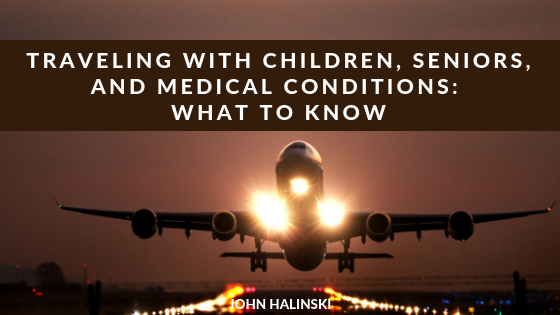The holiday season has arrived, and for millions of people around the world, that means traveling to see friends, family, and loved ones. November and December are two of the busiest months of the year to travel. Thanksgiving travel alone was at an all-time high this year, with a projected 30.6 million passengers traveling for the holiday, according to Airlines for America. The stress of holiday travel can affect many but can cause further concern for seniors, children, and those flying with medical conditions. If you fall into any of these categories or know someone who does, here is some information to help you prepare for a stress-free flight.
Traveling with a medical condition.
If you are traveling with a medical condition or disability, it is recommended to arrive early at the airport to allow yourself enough time to get through security and to ask for any necessary accommodations. All passengers must undergo screening at the checkpoint. If you have any concerns, it is best to speak with a TSA officer when you arrive. You can also show your TSA notification card that lists your medical condition or disability. You can request to be seated at any point in your screening if you have mobility issues and if you are unable to remove your shoes, TSA officials will conduct a physical and visual inspection of your footwear. Mobility aids, health equipment, and devices must also undergo screening, but they will be promptly returned to you following the screening. Keep in mind to follow the 3-1-1 liquid rule while traveling. If you have essential medications for your trip, larger amounts may be allowed, but they should be declared to your TSA officer.
Travelers with intellectual disabilities can have their traveling companion come with them for the screening process and can also request a private screening room. An excellent option for travelers with intellectual disabilities is to participate in an airport rehearsal. One company, The Arc, has two programs, Wings for All and Wings for Autism that are designed to alleviate stress experienced by flying in the air for individuals with intellectual and developmental disabilities.
Traveling with children and seniors.
Modified and expedited screening processes may be available for children under 12 years and seniors over 75 years old. Children and seniors in this age bracket can leave on their shoes and a light jacket. Seniors may request to be seated during the screening if needed. Additionally, a child will not be separated from their parent or guardian during the screening process.
If you have a child who is traveling alone, it is best to check in with the specific airline about what programs they offer for unaccompanied minors to ensure a safe and comfortable ride. Children between the ages of 5 – 14 are considered an unaccompanied minor. Children under the age of 5 may not travel alone.
Remember, if you have any concerns about the screening processing, it is best to speak with a TSA officer to discuss the best ways to approach screening and any assistance that may be needed. If you have any specific questions or concerns, visit the Transportation Security Administration website or contact TSA Cares.
